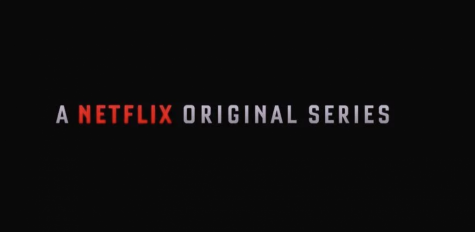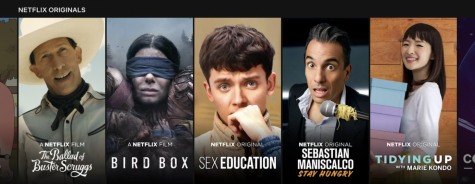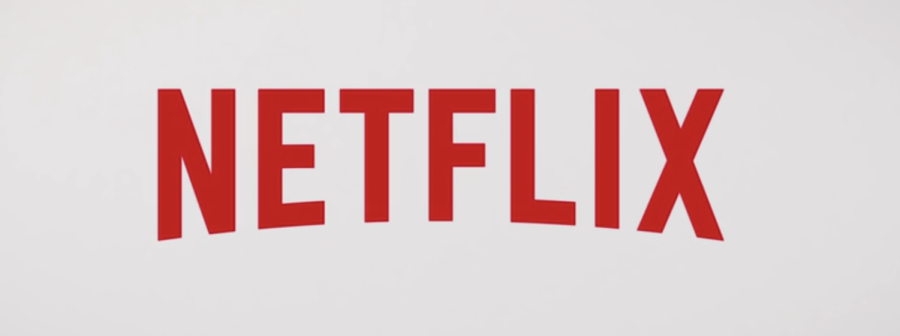Armed With Original Movies: Could Netflix Put Theaters out of Business?
Netflix logo. Netflix was founded in 1997 by Reed Hastings and Marc Randolph originally as an online DVD rental service. Screenshot from Netflix.
February 4, 2019
With over 137 million users across 190 countries, it is hard to ignore the impact Netflix is having on the way we get our entertainment.
Becoming a serious contender against traditional production studios, the platform that’s causing people to turn off cable TV could also cause people to turn away from movie theaters.

The Silicon Valley based company is outcompeting theaters and Hollywood for reasons including marketing choices and capital allocation, but it mainly boils down to a few main ones. First, Netflix has a higher budget than any Hollywood studio, meaning actors and directors want to work with them. Second, they create far more content much more frequently for their viewers compared to any Hollywood studio. And lastly, Netflix’s one annual payment and individual personalization makes an easily accessible online viewing experience compared to going to a theater or watching cable TV.
Netflix has distributed top grossing movies, most recently “Bird Box”, “The Ballad of Buster Scruggs” and “Roma”. Sandra Bullock, Meryl Streep and Dwayne Johnson are just some of the many huge actors Netflix has contracts with, demonstrating Netflix’s readiness to emerge as an even more serious threat in 2019 with big Hollywood names.

It is important to note that just because it is claimed as original content does not mean Netflix had an integral part in the production of that movie. If it is marked as original, Netflix paid a lot of money so you can’t watch it anywhere else; nonetheless, you will not be finding these movies in theaters.
Essentially, it has become more desirable for directors and actors to make programs for Netflix rather than traditional studios. Due to their massive surplus of capital and constant growth, Netflix can afford to give actors more money and give huge budgets to directors, some capping out at $200 million dollars.
The Economist reported in late June, that Netflix has a 2019 content budget of over $13 billion dollars, and 85% of this will be spent for original pieces. The New York Times reported last month that Netflix’s Head of Original Film Scott Stuber estimates the company will come out with no less than 55 original movies in 2019, not including documentaries or comedy specials. One of the most recognizable Hollywood studios, Universal Studios Hollywood, will only come out with 30, allowing Netflix to give their consumers more content on a more frequent basis in a more accessible format.
A once a year subscription offers endless possibility without ever having to leave your home. The tech giant uses advanced technology to track individual user data to understand what you like to watch and then offers you recommendations for your next movie. Due to their global status, Netflix can dub or subtitle movies and shows in dozens of languages, adding to the personalized experience that a theater can’t replicate.
If you happen to be a fan of the modern movie theater, don’t worry, as no drastic changes will be made in the foreseeable future, reports the New Yorker. Yes, Netflix seems to have all the right pieces in place to overthrow Hollywood and theaters; however, it would take a long time for them to pull it off.
The U.S. film industry generated almost $12 billion dollars last year according to Statista, meaning it would take Netflix a while to completely suppress those sales.
In the near future, expect an increase in ticket and concession prices to compensate for the loss of moviegoers.
A decrease in movie quality is also likely if Netflix can strengthen their grip on the film industry. If the company continues to dominate, it will be difficult for traditional studios to compete. With less threatening competitors, a drop in movie quality could be expected, as Netflix will not have to fight as hard for viewership.
Despite what may seem like an inevitable global Netflix monopoly putting theaters and Hollywood out of business as they go, Netflix must first face some challenges head-on.
There is room in the market for other streaming platforms like Amazon Prime Video to compete with Netflix. In addition, Disney announced last month that they are creating their own streaming service, and NBCUniversal will be launching their streaming platform in 2020, as The Wall Street Journal reported this week. The National Association of Theater Owners is fighting hard to preserve what they believe to be the traditional experience of going out to the theaters by “advancing the moviegoing experience.”
Theaters are showing signs of life; however, as The Washington Post reported last month that movie-ticket revenue in the US rose 8% in 2018, the largest year-to-year increase in a decade.
Netflix has also accumulated $8.5 billion dollars in debt, and Reed Hastings, the company’s chief executive, said it will continue borrowing billions for years to come. Unless the company can continue to grow the user base and then increase prices for subscriptions, their large accumulation of debt could be their downfall.



